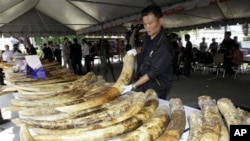Thai customs officials have seized more than two tons of African elephant tusks in the largest haul of smuggled ivory in recent history.
The illegal ivory was the biggest smuggling bust by Thailand to date, worth an estimated $3.5 million and the first seized from a boat shipment.
Thai customs investigators uncovered 247 African elephant tusks Wednesday at Bangkok’s sea port.
The tusks were hidden in a shipment of frozen fish from Kenya, imported by a Thai company.
Prasong Poontaneat, director general of Thai Customs, says the use of a freezer shows ivory smugglers are using more sophisticated methods to try to evade detection.
He says authorities were successful this time because they got intelligence information about the smuggled shipment. They then X-rayed the container and found that the shipment of sardines inside was suspiciously overweight. When they inspected the packages they found the smuggled ivory.
Thailand is a major transit point for trafficking wildlife products, much of which goes to markets in China.
In Thailand, and other parts of Asia, elephant tusks are displayed as a sign of wealth or carved into jewelry and trinkets for tourists or Western markets.
Doug Goessman is a law enforcement advisor with Freeland, a Bangkok-based organization working against wildlife trafficking. He says ivory smuggling through Thailand is becoming more apparent as authorities have cracked down.
"You're seeing more and more come through because more and more is getting seized," said Goessman. "They're doing a better job of interdiction and doing a better job of investigation. The reason it's coming through Thailand is because of the excellent infrastructure."
Goessman says one sign that law enforcement is working is the street price of illegal ivory has tripled in the last year from $450 to $1,500 per kilo.
Thai and African customs officials agreed in November to share intelligence to crack down on ivory smuggling.
Authorities want Thailand removed from a blacklist of known ivory smuggling routes.
Thailand’s last major African ivory bust was a year ago when 239 tusks were seized at Bangkok’s international airport.
Despite stepped-up law enforcement, Thai authorities acknowledge the demand for ivory is still high and is encouraging poaching of elephants in Africa.
The United Nations effectively banned the international trade in ivory in 1989, after years of poaching led to a dramatic drop in elephant populations.










